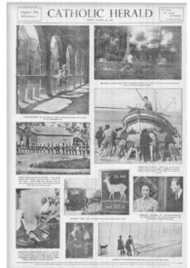Page 8, 20th August 1937
Page 8

Report an error
Noticed an error on this page?If you've noticed an error in this article please click here to report it.
Tags
Share
Related articles
More At Lourdes: At Least 21 Million Pilgrims Are Expected
O0000h Matron!
Shelter City For The Poor
Fr Martin Moran Omi, Priest To English-speaking Pilgrims...
What Can Be Done To Improve The Liturgy
IN A FEW WORDS
Peccant Pilgrims
WHY cannot we Catholics be more
considerate? Departing Lourdes pilgrims at Edinburgh, I notice, have put upon a travelling gentleman the trouble of writing to the Evening Dispatch to point out that the entraining of the sick pilgrims at the station, besides being a distressing sight, created " a certain amount of inconvenience." He feels it is unfortunate that such undertakings should occur " in the height of the busy season," and he suggests that the railway company ought to do something about it. But life is like that. What did those maimed and tortured sufferers on the stretchers care if one of their fellow-creatures was in danger of being shoved against on the platform? Even the Royal Navy should learn consideration. As an explosive player on the links, caught in a verbal outburst, very reasonably remarked : " How can one play golf when these infernal ships keep coming up the Channel?"
A Book to Look Out For
ABOOK to look out for this autumn is
Science and Common Sense. which Messrs. Longmans are bringing out. The author, Dr. W. R. Thompson, F.R.S., is one of the most distinguished of our co-religionists. Though he is not well-known to the general public, at one period he wrote regular science notes for the Catholic Herald and occasional articles in the Tablet. The reason is that, like the best men of science, he is too busily engaged on his own special work in entomology to find time for the kind of lighter article by means of which the second-rate scientists make themselves well-known.
A Philosopher
However, Dr. Thompson—have we any other Catholic Fellow of the Royal Society? —is exceptionally well-qualified to be a publicist on the broader aspects of science in its relations to thought in general, for he has been a close student for years of Thomist philosophy. The essay which he is shortly to publish is in fact a general survey of the relations between science (the practical aspect of modern science as intimately nnderstood by a master) and philosophy. The subject matter is not new. but it is only very rarely. that Catholics have a chance of reading the reflections of a really eminent man of science who is also a Catholic and a philosopher. If the general public can rise to the book, it may encourage Dr. Thompson to continue writing and thus to perform an invaluable apologetic work and add his name to the not too impressive list of Catholic writers whom non-Catholics dare not neglect.
A G.K.C. Story
STAYING recently on the edge of the South Downs near Pulborough, I was reminded of an old G.K.C. story which, however, I find not to be as well-known as
1 thought. Chesterton was planning to climb the Downs and to do some sketching there. When he had reached a suitable spot, he took out his paper, easel, etc. To his horror. he then discovered that he had forgotten the most important item of all, the chalk. He stamped the ground in annoyance at his stupidity, and discovered, in so doing, that he was standing on tons of chalk. It's always like that in life," he would sits. relating the story, " it's the things nearest to you that you fail to see!"
By the way, is there any country in the world id equal the South Downs on a burning August day? What a country this would he, if only it were always hot and sunny—:but then, if it were so, it wouldn't be the beautiful, fresh country we know. (Chestertonian reflections there, too).
How tst Deal with Truth
4‘ riF Red Press killed the sale of my
book, Death in the Morning, in spite of the Book Society's recommendation," *rites Mrs. Helen Nicholson. " The reviewers said I was either a liar or halfwitted, So that was that." The odd thing is that Death in the Morning, which was reviewed in the Catholic Herald (June 11) could not be called propaganda. It was patently the objective experiences of a woman in one tiny spot of Spain during a few weeks after the beginning of the conflict. References to the war in general and its significance were rare and nearly all reported at second-hand. Moreover, it was literature. We signalled it out as a
vital book for these reasons, and are not surprised at the intelligence of the Red propaganda which selected the book for its special damnation.
Mrs. Nicholson further writes that on her return from Spain " everyone here who had never been to Spain began to tell me all about the war there. When 1 tried to say anything they told me firmly 1 was mistaken and knew nothing about it."
THE JOTTER.
blog comments powered by Disqus

















